Asylum seeker's fear over new sites after Penally stay
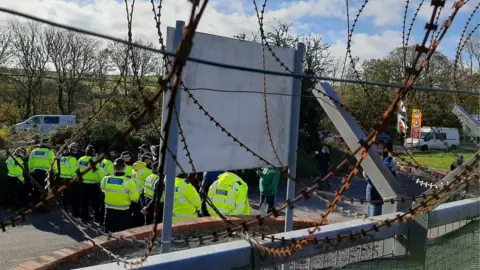 BBC
BBC"It was the worst period of my life because I thought it would never end."
Hassan - not his real name - was one of hundreds of asylum seekers housed at an army camp in Pembrokeshire in 2021.
Penally, run by Clearsprings Homes, was later closed after a scathing report, but Hassan is concerned plans to house more men at two new sites, including Stradey Park in Llanelli, will involve that company.
Clearsprings Homes said it was unable to comment.
The Home Office said any new sites would provide asylum seekers with food and other essentials.
The Stradey Park Hotel in Llanelli, Carmarthenshire, is set to house up to 207 asylum seekers from 3 July.
The Welsh Refugee Council said current asylum seekers would feel "rightly" worried about parallels between the new plans and the closed Penally site.
It said the UK government needed to show it had learnt from previous mistakes.
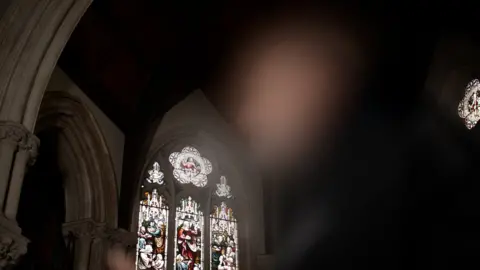
Hassan said he fled to the UK after political problems in his home country.
He had been housed in London for three months in 2020 when he received a phone call telling him to board a bus one evening.
"A bus came and it was full of men. They squeezed us onto the bus. It was lockdown, Covid's peak, and they put us all together," he said.
He claimed the bus drove for hours through the night without anyone telling the men where they were going.
"It was very dark when we arrived at the camp," he said. "We were all scared."
'Middle of nowhere'
Hassan said the men were asked to get into groups of six or 12 so they could be allocated a room to share but could not fully take in their surroundings until the next morning.
"We were all shocked because it was like a prison," he said.
"The camp was surrounded with barbed wire, it had iron gates and it was in the middle of nowhere.
"It wasn't proper for winter. And for just all men together in the same place. No activities. All the bathrooms, all the toilets, the dining hall… everything was located outside."
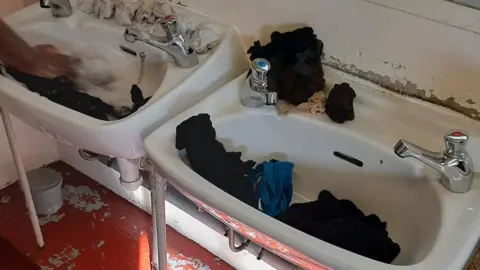
Welsh Refugee Council's chief executive Andrea Cleaver said often when asylum seeker sites opened, the standard would be "far below" what may have been promised.
She said people were being "kept in the dark" over plans in Llanelli and criticised the "insufficient information" from the UK government.
"Generally speaking, these large multi-occupancy sites have tended to be held in locations which are far from services.
"Hotels [like the proposed new sites] are never a great idea for housing people because they stop people from flourishing.
"But they are generally an even worse idea when you're talking about large numbers of people in areas."
Llanelli Member of the Senedd (MS) Lee Waters said he worried "far-right groups" with their own agenda, and a lack of official communication from the Home Office about plans, had created an "incendiary" mix.
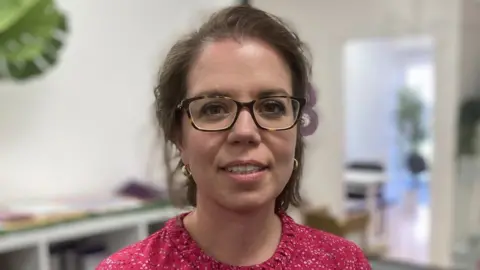
Hassan said the remote location and lack of any distractions onsite at Penally made life harder for those housed there.
"I felt useless. Just useless. A human being should not be treated in that way," he said.
"OK, we are refugees or asylum seekers, but no-one wants to lose his or her own country. We were happy [in our lives], but we had to come here."
He said broken washing machines meant the men would sometimes have to wash their clothes in sinks and outdoors, while communal showers and bedrooms meant they had to wash and change in front of each other.
"When I talk about the camp. I still feel very emotional," he said.
"After a while, some people had some mental health issues, some health issues. We couldn't find doctors or psychologists."
When inspectors visited Penally and another site in Kent in 2021, they found cramped, filthy conditions.
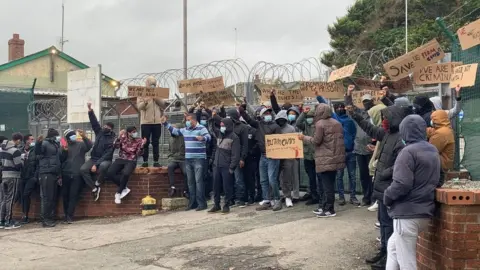
The Home Office has previously said the site provided "safe and secure accommodation".
A current backlog of asylum seekers has seen some housed in hotels, something the UK government said was unacceptable.
Plans would see new sites, which includes former and current hotel buildings, being repurposed into asylum seeker sites.
The Home Office said: "There are currently more than 51,000 asylum seekers in hotels costing the UK taxpayer £6m a day.
"All asylum seekers in hotels are provided with full board accommodation, with three meals a day served as well as all other essentials, including cash payments where eligible.
"Asylum seekers are not detained at hotels and are free to leave their accommodation."
You can watch Wales Live on Wednesday at 22:40 BST on BBC One Wales and on BBC iPlayer.
